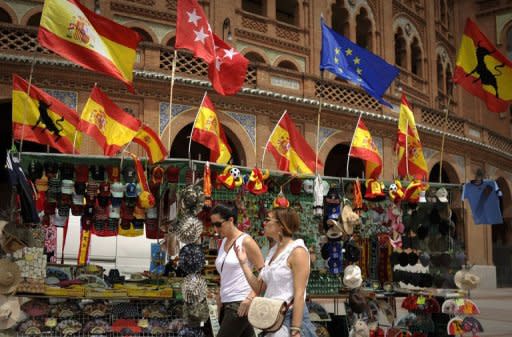Markets' mixed close as Spain euro-phoria fades
European stock markets closed mixed on Monday, as euphoria over the up to 100 billion euros ($125 billion) in eurozone loans to Spain for its troubled banking sector began to fade. London's benchmark FTSE 100 index was essentially unchanged at 5,432.37 points after posting solid gains earlier in the day. In Frankfurt, the DAX 30 edged up by 0.17 percent to 6,6,141.05 points but in Paris the CAC 40 slipped by 0.27 percent to 3,042.76 points. Madrid gave up 0.54 percent to 6,516.4 points following a eurozone deal to loan Spain up to 100 billion euros ($125 billion) to stabilise struggling banks. In Milan the FTSE MIB, lost 2.79 percent to 13,071 points as the country seemed to be next in the line of fire from market speculators. Most European stock markets and the euro had climbed higher earlier on Monday as investors welcomed the deal. Asian equities had rebounded sharply earlier in the day, with Tokyo up 1.96 percent and Hong Kong 2.44 percent higher. Brent oil prices meanwhile advanced back above the key level of $100 per barrel on hopes the Spain deal will ease concerns over the economic outlook. Eurozone finance ministers on Saturday threw Spain a lifeline to save its stricken banks amid efforts to avert a broader financial catastrophe. Spanish Economy Minister Luis de Guindos insisted the handout was not a rescue but a loan that imposes conditions on the banks. However, it marked a dramatic climbdown for Madrid, which had denied it needed any outside aid. The nation's borrowing costs fell early on Monday, but later rose as the funds will add to Spain's debt and investor concerns about the sovereign debt position. Spanish 10-year government bonds yields initially tumbled to a low of 6.017 percent from the previous close of 6.08 percent but then jumped back to 6.407 percent, a level widely considered unsustainable in the medium-term. Benchmark German 10-year bonds traded with a yield of 1.333 percent as the Bund continued to represent one of the safest placements for institutional investors. "As much as the perception of the situation in Europe may have changed, plenty of risk still remains in place," Gekko Global Markets analyst Anita Paluch said. She underscored "question marks over the ability of Spain to repay the debt, especially, if the country fails to get back on the growth path." In addition, "the outcome of the upcoming Greek elections and the perception of situation in Italy" weighed on market sentiment, Paluch said. However the Spanish banking deal was hailed by Germany, France, Japan, China and the United States as well as the International Monetary Fund (IMF). But traders said the euro's gains were unlikely to last as the Spain loans were not a comprehensive solution to wider regional problems, especially given rising uncertainty ahead of Greek elections on June 17. "Relief concerning Spain's banking rescue could be rather short lived with Greek elections now less than a week away and expected to take centre stage once again very soon," noted ETX Capital analyst Markus Huber. Investor concerns have weighed on the euro with tensions high over fears Athens may exit the bloc following the polls. The unit had tumbled to multi-year lows against the dollar and yen in recent weeks.


